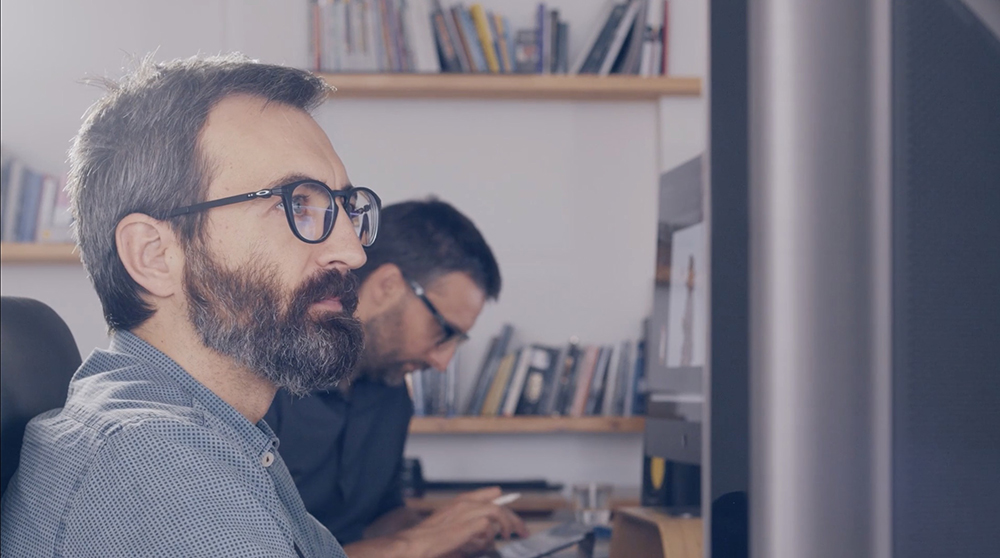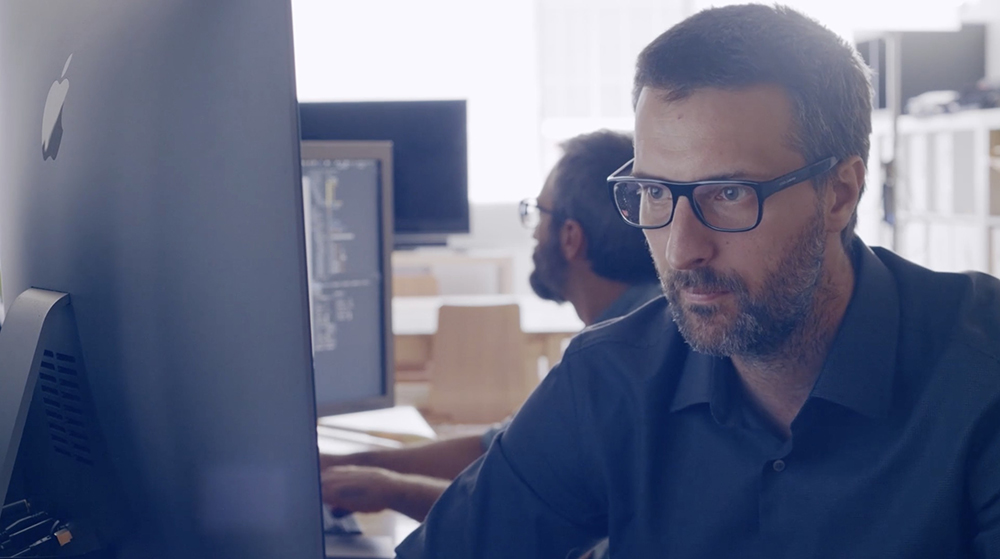Today we are very happy to welcome Davide from ZoneCreative, a very creative and original producer of stock photography and video. We have always been big fans of them and thank them for sharing their workflow with all of you!

Hello Davide, it is a pleasure to have you with us!
Hello Luis, it is a pleasure to get in touch 🙂
Tell us a bit about ZoneCreative? Are you a team with various talents?
Daniele and me founded ZoneCreative about 15 years ago together with two of our dearest friends Alessandro and Marco. Originally, it was just to do stock productions. Then it became a creative agency. Some years ago Alessandro and Marco each took different paths, so from then onwards, Daniele and me have been running the company. I’m the “technical” side of the actual duo-team while Daniele is the creative director. Since we are small, we always work together on our projects from concept to full production.

Where is ZoneCreative from?
We are italians, we live and work in the small city of Biella, located in the northwest side of the country, very near to the Alps.
ZoneCreative has a recognizable style with a very conceptual photography combined with a good sense of humor. How did you develop this style? Are you all as humorous in real life?
We really started producing such content because we enjoyed it a lot! Many times we modelled in our past productions. In later years we changed our production style and became more video-centric and lifestyle-oriented mainly because of the general direction of the market. But we still try to add some kind of originality to our productions, when we have the time between client work and other internal projects. But I think we are still humorous!
Do you travel to produce new content? Or do you produce it all at your home base?
A mix. Sometimes we travel, mainly in Italy. Especially if we do stock productions during a client project. I would say that in these latest months we stayed at our studio most of the time.
How did Zone Creative get started in stock photography?
We considered stock photography a game at the beginning. We had been exclusive contributors for iStockphoto for many years, and the first productions were horrible… literally.
When and how did you realize that microstock had potential?
Our first content success was a picture of a red apple on white background. Not a really original concept, but back then it got published frequently and probably was one of the most reddish and “conceptual” pictures of a red apple and it was downloaded many times. That’s when we realized stock photography could become a job.
Do you work in a studio? Or in an office and rent out studios or locations based on the projects?
Since we also do projects for clients, it really depends on the situation. Sometimes we stay in our studio, which is quite big (we have space for photo/video, for music production and our office). We do conceptual shots or small scenographies normally at our “home” base.
Does Zone Creative work only on stock photography and videography? Or do you also do client work?
For clients we make branding and content production (here is a link to our YouTube channel). We also have some internal projects such as Soeliok, a fantasy universe we created as a publishing project.
If you do client work, why do you mix client and stock work? And why do you think it is necessary to do both stock and client work?
The stock media world is changing so fast, that we prefer to mix multiple kind of incomes. Also, client and internal projects allow us to stay more creative and to explore many areas of communication that we can apply back to our stock productions.
Does client work inspire your stock business and vice-versa?
Inspiration flows more from client work to stock productions, mainly because clients make us aware of the kind of stock content lacking in terms of quantity and quality.
Describe to us what your production workflow is, and what roles each team member has.
We keep track of various trending concepts in our minds (not really in our minds, actually a mix of documents and mind maps :D) and when we have enough information in terms of mood, colors and assets we start to think about scenes and point of view for these scenes.
It doesn’t have to be a big production, we usually concentrate on a specific aspect of a concept and then produce some content. We use many techniques that may involve color grading, compositing, 2D and 3D compositing or full 3D production. Daniele is involved in the pre-production, creativity, production. I am mostly involved in production, post-production and metadata.
What are your thoughts on the balance between quality and quantity? What balance have you found for your own portfolios?
We would really like to focus on quality over quantity, but it really depends because it is not always clear what will sell and what will not: so we mix quality and quantity depending on the production effort of each shot.
Where do you get your inspiration for your conceptual work?
Well, I think today it is more difficult to NOT find inspiration! 🙂 . There are so many great artists and people doing things, that the most difficult part is to stay focused and not get lost in the great ocean of information. Anyway, we mainly get inspiration from the internet exploring new techniques and from the “real reality”, as well as trend sites to get concepts.
How much do you try to innovate? And how much do you try to re-interpret your past successful themes and concepts?
We like to try a lot of different techniques. Usually we try to introduce a new technique for each client project. It helps us continue with self-improvement. We would like to re-think previous work, but normally we try to create new content. This is really an important point that we need to improve on, since we can only work on stock for a fraction of our week’s time.


Thank you for sharing this image with us. What does the revenue curve tell us? Why do you find it interesting?
It is obviously a seasonal Christmas image, we can see it clearly from the period of the year in which it is downloaded. What I found interesting in this case is that, while most content has a lifetime with a descending curve, some seasonal content can grow years after the upload date and that they can go up, then down, then again up. I think the chance to get this type of sales graph is larger with seasonal content because not a lot of similar content gets created during the year.
How important is data analysis and data accounting for you? How do you integrate accounting and analytics into your workflow?
It is very important to evaluate the effectiveness of a choice we made. It allows us to see whether it is worth to upload more content from a specific shoot and, in general, it helps us see which path we should follow for the next productions.
What is your most valuable feature in Stock Performer?
Personally I always search for aggregated data. It saves time and it shows trends and correlations otherwise overlooked. Stock Performer is essential in this matter.
What do you think about exclusivity, either artist exclusivity or image exclusivity? And how do you explain your current choice?
As I said before, we were exclusive on iStockphoto from 2006 to 2015. We surely enjoyed those years a lot, since we met a lot of great people and the whole experience was very friendly. We cannot be thankful enough, because due to that we are here today. Then, agencies and the industry inevitably evolved and changed: now the work is more “industrial”.
We try to keep our creative approach but we understand that maybe the stock market is not the right place to express that anymore. It is not necessarily a bad thing , I just wish that today’s contributors could have lived those years in which companies were smaller and more familiar.
I don’t think exclusivity is the best option today since things change really, really fast
Do you have the same amount of pictures on each agency?
Almost. Some agencies reject content that others approve. Sometimes an agency rejects content and then approves it after two weeks without changes from our side. It’s always a subjective opinion in the end.
How many agencies do you deliver to?
We deliver to about 5-6 main agencies.
Do you believe it is important to keep an eye open for upcoming trends? How do you recognize them in advance?
Yes, I think it is really important to look for the opportunity of gaining a niche market. Finally, lots of trends are on social networks, reddit and so on. I have to say that for non-US people it is more difficult to get onto those trends because of the cultural differences.
Do you track the revenue and costs of each individual shooting? Or do you simply look at overall revenue and cost? What works best for you?
We track the revenue of each shooting, but then we make decisions on overall revenue.
2020 has been an incredibly challenging year for everybody. How has it affected your stock business? What has changed for you?
We produced sessions from home and we made some experiments. We didn’t get a big hit in sales. We really took the time to develop other internal projects, such Soeliok.
What advice would you give aspiring contributors to be successful in this business? Do you think it is essential to build up a team? Or can one succeed alone?
Today it has become really difficult to succeed in certain areas of stock content since it is necessary to have big productions, good models and it is essentially a bet.
I think the way forward for new contributors is to find a niche and concentrate on that. It is also import to not overlook metadata, since people find the content with that. The most important thing: don’t expect great results without great efforts. It is not really important whether this effort comes from a single person or a team.
Do you think the current market is over-saturated with content? Do agencies have too much content in their libraries? How can contributors work in such an environment?
I think today is generally oversaturated with everything! Tons of information, fear to stay behind, too little time to keep up. Agencies have approved too many “not really nice” content.
As I said before, the challenge here is to focus, keep track, chill out and produce high quality niche contents. And have a nice life outside of work, since there are more important things.
Where do you think the stock business is going? How do you see the next years?
The next challenge is competition from free and subscription content, so I think the biggest agencies should rethink their business model for the years to come if they want to remain in the market with a crowdsourcing model. You cannot simply drop down prices and contributor revenue without consequences.
Tell us, when you are not busy producing stock, how do you like to spend your free time?
Mostly enjoy the simple things of life such living new experiences, learning, meeting friends and family, talking about dreams, hopes and problems. Each one of us has hard times sometimes, the people around us could be the way out.
Thank you very much for your time, it was a pleasure interviewing you!
Thanks Luis!
You enjoyed this interview? Then read more here: Interview Series
Sign up to Stock Performer and see how we can help you make more money. The first month is completely free!